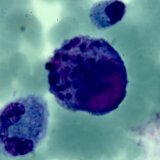Epstein-Barr virus: symptomatology and treatment
 According to statistics, 90% of people in older children and after 40 years are "familiar" with the Epstein-Barr virus, immunity has even developed to it, but the patients themselves do not know it.But, unfortunately, in some cases, the virus in question has an extremely negative effect on the work of organs and systems, and "acquaintance" with it ends not with the usual development of immunity, but with severe, sometimes life-threatening complications.
According to statistics, 90% of people in older children and after 40 years are "familiar" with the Epstein-Barr virus, immunity has even developed to it, but the patients themselves do not know it.But, unfortunately, in some cases, the virus in question has an extremely negative effect on the work of organs and systems, and "acquaintance" with it ends not with the usual development of immunity, but with severe, sometimes life-threatening complications.
Infectious mononucleosis
If the Epstein-Barr virus is acute, doctors will diagnose "infectious mononucleosis".It is noteworthy that this virus penetrates the human body through the respiratory tract and most often it occurs through the mouth, therefore, the disease under consideration has received another, beautiful and unofficial, name "illness of kisses".
Recommended to read: 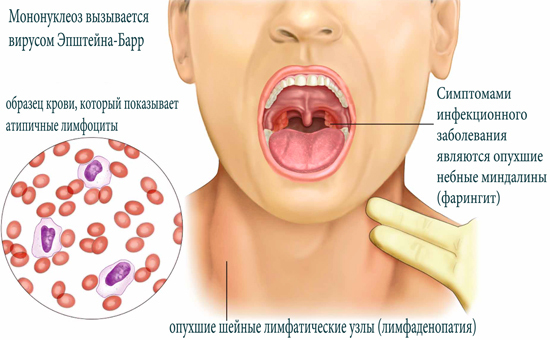
The Epstein-Barr virus( EBV) begins to multiply in the lymphoid tissue( in its B-cell cells) and within a week after infection, the symptoms appear in humans that are identical to acute respiratory disease.
Patients present the following complaints:- Increased and reddening of palatine tonsils( glands), on them almost in all cases a white coating is formed.
- Enlargement of lymph nodes in the neck, in the groin, armpits, in the back of the neck.
- Increased body temperature, often to critical levels.
- Pain sensations behind the sternum, in the abdomen - in this case, the doctor at the examination of the patient will find in it a cluster of enlarged lymph nodes in the abdominal cavity and / or mediastinum.
A physician will notice the enlarged liver and spleen when examining such a patient, and a laboratory examination of the patient's blood test will show the appearance of atypical mononuclears of - young blood cells resembling both monocytes and lymphocytes.
There is no specific treatment for infectious mononucleosis - it has been proved that any antiviral drugs are ineffective, and antibiotics should be used only if a fungal or bacterial infection is attached.The patient should spend a lot of time in bed, get plenty of drink, take antipyretic, gargle.As a rule, the body temperature is normalized after 5-7 days after the onset of the disease, the enlarged lymph nodes return to the initial state after 20-30 days, and the blood counts after 4-6 months.
Note: if a person has suffered an infectious mononucleosis, then antibodies in his body are formed and persist for a lifetime - immunoglobulins of class G , which provide further ignoring of the virus.
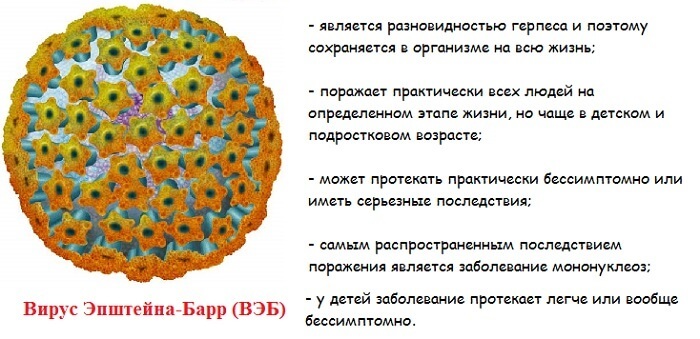
Chronic EBV infection
In the absence of a response from the human immune system, the infection can develop into a chronic course. Doctors consider 4 types of chronic VEB infection:
- Atypical. In this case, the patient has frequent recurrences of infectious diseases of the intestine, genitourinary tract, as well as acute respiratory diseases.Treatment of such pathologies succumbs heavily, their course is always protracted.
- Generalized .Under the "impact" of the infection is the nervous system( encephalitis, meningitis or radiculoneuritis develops), the heart( myocarditis is diagnosed), the lungs( progressing pneumonia) or the liver( hepatitis develops).
- Wiped .This is the slowest form of chronic VEB infection: periodically the patient rises in temperature, often it keeps within the limits of low-grade indicators( 37-37, 8 degrees), there is increased fatigue, constant drowsiness, pain in muscles and joints, lymph nodes may increase.
- Active. The patient will have classical symptoms of infectious mononucleosis( fever, angina, lymphadenopathy, etc.) - they often recur, complicated by the attachment of a fungal or bacterial infection, rashes on the skin of a herpetic nature.In the case of active chronic VEB infection, intestinal pathology may develop, and in this case, patients will complain of lack of appetite, nausea, intestinal colic, and stool disorders.
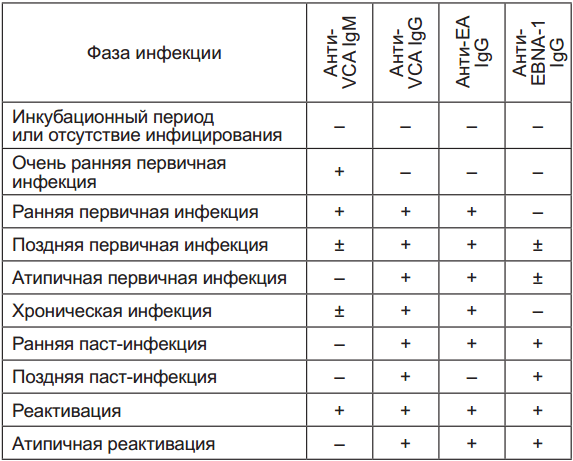
Note: for chronic VEB infection, doctors can detect the virus itself in the patient's saliva( PCR method), and can detect antibodies to nuclear antigens, but they are formed only 3-4 months after the virus entersOrganism.In any case, this is not enough to make an accurate diagnosis, so virologists and immunologists conduct studies of the entire antibody spectrum.
What is the Danger of the Epstein-Barr Virus
If the above cases describe the occurrence of VEB infection in a relatively mild form, then this section will describe the most severe manifestations of the pathology in question.
Genital ulcers
This disease is diagnosed by physicians very rarely and mostly in the female half of patients. Symptoms of genital ulcers against the background of the Epstein-Barr virus:
- on the mucosa of the external genital organs ulcers of small sizes are formed;
- as the disease progresses, sores increase in size, become painful and get eroded;
- increases body temperature;
- lymph nodes in the inguinal region and armpits increase.
It is interesting that genital ulcers against the described virus are not amenable to any treatment - even Acyclovir, which helps in case of herpes simplex type-http: //okeydoc.ru/ genitalnyj-gerpes-simptomy-zabolevaniya-metody-lecheniya-i-profilaktiki /, is considered ineffective in this case.But ulcers, as a rule, independently disappear without relapses.
Note: The hazard is the high risk of attachment of a bacterial or fungal infection - ulcers are "open gates."In this case, you will need to undergo a course of antifungal or antibacterial therapy.
Diseases of oncological nature
There are a number of oncological diseases, in the development of which no one disputes the role of the Epstein-Barr virus - there are scientifically proven facts. These diseases include:
-
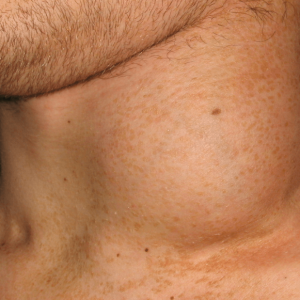 Hodgkin's disease ( lymphogranulomatosis).There is a pathology of a sharp decrease in weight, weakness, dizziness and an increase in lymph nodes in almost all locations.Diagnosis is complex, the end point in this can only put a biopsy of the lymph node - it will be found giant Hodgkin cells.Treatment consists in conducting a course of radiotherapy - according to statistics, remission is observed in 70% of cases.
Hodgkin's disease ( lymphogranulomatosis).There is a pathology of a sharp decrease in weight, weakness, dizziness and an increase in lymph nodes in almost all locations.Diagnosis is complex, the end point in this can only put a biopsy of the lymph node - it will be found giant Hodgkin cells.Treatment consists in conducting a course of radiotherapy - according to statistics, remission is observed in 70% of cases. - Burkitt's lymphoma .This disease is diagnosed exclusively in children of school age and only in African countries.The tumor can affect the ovaries, kidneys, lymph nodes, adrenal glands, lower / upper jaws.There is no effective treatment for Burkitt's lymphoma.
- Lymphoproliferative disease .This is a group of diseases characterized by proliferation of lymphoid tissue of a malignant nature.This pathology is manifested only by enlarged lymph nodes, the diagnosis can be made after the biopsy procedure.Treatment is carried out on the principle of chemotherapy, but it is impossible to give any general predictions - it all depends on the individual characteristics of the course of the disease.
- Nasopharyngeal carcinoma .It is a malignant tumor that is located in the nasopharynx, in its upper part.Most often, this cancer is diagnosed in African countries.Symptoms of nasovarineal carcinoma include regular nasal bleeding, sore throat, constant headache, and hearing loss.
Autoimmune Disorders
It has been scientifically proven that the Epstein-Barr virus can affect the body's immune system, causing the rejection of its own cells - this leads to autoimmune diseases.Most often, the virus in question provokes the development of autoimmune hepatitis, chronic glomerulonephritis, Sjogren's syndrome and rheumatoid arthritis.
In addition to the listed diseases, the development of which can provoke the Epstein-Barr virus, it is worth mentioning chronic fatigue syndrome .It is often associated with the viruses of the herpes group( and this refers to it) and manifests not only general weakness, fast fatigue, headaches, apathy and disturbances of the psycho-emotional background.Quite often against this background there are recurrences of acute respiratory diseases - this is how infectious mononucleosis manifests itself.
There is no single scheme for the treatment of the Epstein-Barr virus.Yes, in the arsenal of doctors there are specific medications - for example, Acyclovir, Polygam, Reaferon, Famciclovir, Alfaglobin, Cycloferon and others.But the purpose of their appointment, as well as the duration of administration and dosage should be determined only by the attending physician after a complete examination of the patient, including the laboratory.
Tsygankova Yana Aleksandrovna, medical reviewer, therapeutist of the highest qualification category

